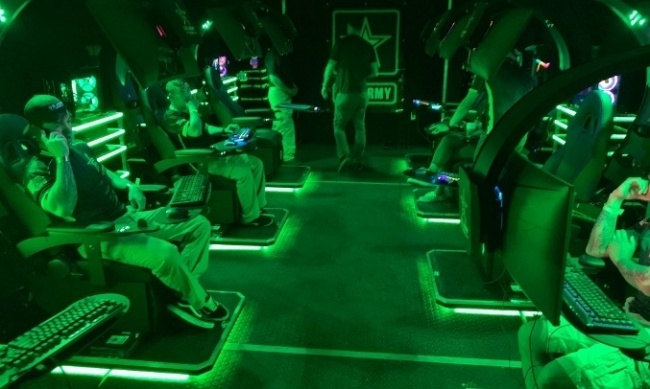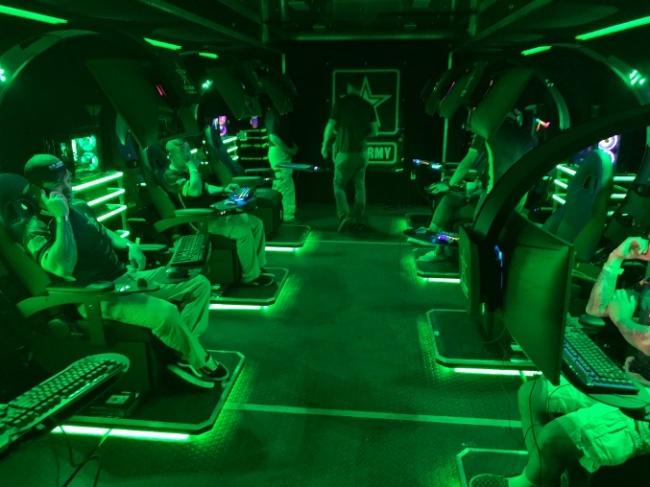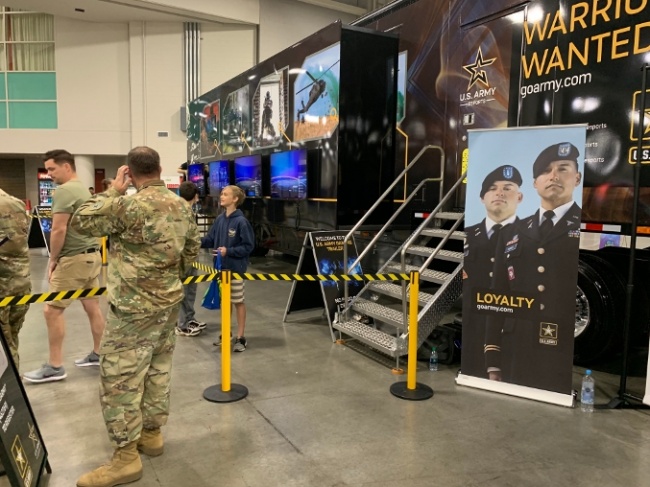“Many people particularly in the Northern part of the US don’t have much personal connection to the military,” explained Sgt. First Class Robert W. Dodge, media liaison for the team. “We want to show them there’s more to the Army than they see on the news.”
Would You Like to Play a Game? The Army eSports team consists of 16 active duty soldiers from various parts of the service selected through a competitive tournament. Once selected for the team, playing videogames for the military becomes their full-time job for the next three years, and they can’t be reassigned to other duties. Dodge says the players were not recruited specifically for their gaming prowess; they’ve all been through basic training and had another specialty prior to joining the squad. “We have a few communication specialists, some mechanics, even a Special Forces soldier,” he said.The team competes in all of the major games across platforms, including Fortnite, League of Legends, Overwatch, Apex and specialized games like Mortal Kombat. From the looks of the inside of the trailer, the Army has not spared much expense in equipping the team with state of the art gear and furniture.
Since the team was formed in September 2018, it has competed in informal tournaments and exhibitions around the country and is ramping up for major competitions. The eSports initiative is part of a larger campaign organized through US Army Recruiting Command designed to bridge the gap between the military and other parts of US society, and expand the appeal of military service to a younger generation that’s seen most of its combat through the lens of Gears of War. Dodge says there are 18 outreach campaigns targeting different audiences, including fitness, outdoor sports, and more generalized experiences like virtual flight and combat simulations. Each has its own team, vehicle and support staff.
An Army of (Xbox) One. The imposing Army eSports trailer made its convention debut at the Salt Lake Gaming Con, but expect it to appear at other regional game-focused events over the coming months. SFC Dodge says the next stops are Austin, TX and Pittsburgh, PA, with future dates to be determined. He confirmed that big shows like PAX, San Diego Comic-Con and NYCC are not on the menu at the moment but may be if the program gains traction.
Dodge says the Army purchases space at shows just like any other exhibitor, which means shows that are already booked up or can’t accommodate the giant vehicle probably aren’t in the cards. But frankly, for the lower and middle tier of gaming shows, particularly ones that are challenged to fill their exhibit halls with impressive vendors, the Army mobile eSports vehicle represents a solution that can make sense financially while offering something of legitimate interest to some attendees.
Deployed to a Conflict Zone? Whatever business and recruiting interests are served by this program, the presence of the US Army at fan shows seems like one of those things that seems destined to further exacerbate cultural and political tensions within fandom. I’ll bet at least a few readers have been having some negative reactions just reading about this program and the taxpayer resources that are going into funding it.
As the Army itself is aware, much of American culture in general has no institutional or personal connection to the military, so the potential for misunderstanding is great. Though there is general agreement that military service per se is honorable, when we see the military in action through the media, they are carrying out missions on behalf of American policy that divides strongly along ideological lines. If you are morally or politically opposed to the wars and actions we’ve been undertaking for the last 20 years, worry about the symbolism of the military in today’s fraught cultural and political environment, or object to how the military has targeted certain vulnerable communities for recruitment into combat service, the Army’s flamboyant, high-tech outreach to gamers can have sinister connotations. In fact, the more slick and sophisticated the outreach, the more alarming it might seem.
And precisely because this program has potential to raise concerns among critics of American foreign policy, there are others who will be gung-ho to see uniformed military and their gear paraded at conventions just because they assume it will “trigger the libs.” In a gaming culture where those battle lines are already drawn, this is a bad combination, maybe not in Salt Lake City, but quite possibly on the coasts or in other regions where suspicion of militarism and our current national leadership are higher.
None of this is the fault of the Army. They have recruitment goals and are making an effort to meet the current generation on their own terms. Gamers tend to be competitive, tech-savvy folks who can master complicated skills quickly, which sound like useful qualities in a soldier. And the organization is certainly right to recognize the gap that exists between the military and society at the moment.
As soldiers, the good folks manning the Army’s shiny new eSports exhibition don’t get to choose their battlefield. Hopefully the cultural battlefield of fandom won’t choose them.
The opinions expressed in this column are solely those of the writer, and do not necessarily reflect the views of the editorial staff of ICv2.com.
Rob Salkowitz (@robsalk) is the author of Comic-Con and the Business of Pop Culture






